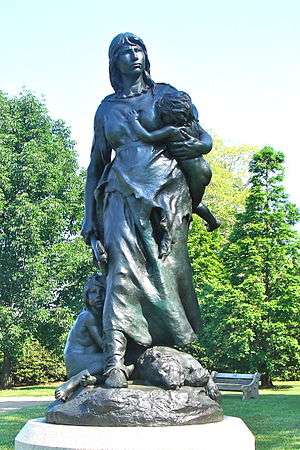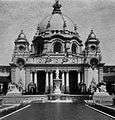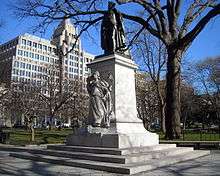John J. Boyle
For other people named John Boyle, see John Boyle (disambiguation).
| John J. Boyle | |
|---|---|
 John J. Boyle in 1914 | |
| Born |
1851 New York City |
| Died |
February 10, 1917 (aged 65–66) New York City |
| Nationality | American |
| Known for | Sculpture |
| Spouse(s) | Elizabeth Carroll |
John J. Boyle (1851, New York City - February 10, 1917, New York City) was an American sculptor.[1][2]
He studied at the Franklin Institute, Pennsylvania Academy of the Fine Arts, and École des Beaux-Arts. He married Elizabeth Carroll, in Philadelphia, in 1882.[3] In 1910, he was elected into the National Academy of Design as an Associate member.[4]
Boyle died at his home in New York City in 1917.[5]
Selected works
- The Alarm, (Indian Alarm) (1884), Lincoln Park, Chicago, Illinois.[6]
- Stone Age in America (1887), Fairmount Park, Philadelphia, Pennsylvania.[7]
- Tammany, 42nd New York Infantry Memorial (1891), Gettysburg Battlefield, Gettysburg, Pennsylvania.
- Sir Francis Bacon (1894–96), Library of Congress, Washington, D.C.[8]
- Plato (1894–96), Library of Congress, Washington, D.C.[9]
- Benjamin Franklin (1896–99), University of Pennsylvania, Philadelphia, Pennsylvania. A replica was exhibited at the 1904 Saint Louis World's Fair in Saint Louis, Missouri.[10]
- Bust of Charles Lenning (1900), University of Pennsylvania, Philadelphia, Pennsylvania.
- The Savage Age in the Eastern Hemisphere (1901), Pan-American Exposition, Buffalo, New York.
- The Savage Age in the Western Hemisphere (1901), Pan-American Exposition, Buffalo, New York.
- Bust of James V. Brown (1907), James V. Brown Library, Williamsport, Pennsylvania.[11]
- John Christian Bullitt (1907), City Hall, Philadelphia, Pennsylvania.
- Rebecca at the Well (1908), Fairmount Park, Philadelphia, Pennsylvania.[12]
- Commodore John Barry (1911–14), Franklin Square, Washington, D.C.[13]
Gallery
- Indian Alarm (1884), Lincoln Park, Chicago, Illinois.
 Stone Age in America (1887), Fairmount Park, Philadelphia, Pennsylvania.
Stone Age in America (1887), Fairmount Park, Philadelphia, Pennsylvania.- Tammany, 42nd New York Infantry Memorial (1891), Gettysburg Battlefield, Gettysburg, Pennsylvania.
 Sir Francis Bacon (1894–96), Library of Congress, Washington, D.C.
Sir Francis Bacon (1894–96), Library of Congress, Washington, D.C. Plato (1894–96), Library of Congress, Washington, D.C.
Plato (1894–96), Library of Congress, Washington, D.C. Pan-American Exposition (1901). Charles Grafly's Fountain of Man is center. Boyle's The Savage Age in the Eastern Hemisphere is left; The Savage Age in the Western Hemisphere is right.
Pan-American Exposition (1901). Charles Grafly's Fountain of Man is center. Boyle's The Savage Age in the Eastern Hemisphere is left; The Savage Age in the Western Hemisphere is right. John Christian Bullitt (1907), City Hall, Philadelphia, Pennsylvania.
John Christian Bullitt (1907), City Hall, Philadelphia, Pennsylvania.- Rebecca at the Well (1908), Fairmount Park, Philadelphia, Pennsylvania.
 Commodore John Barry (1911–14), Franklin Square, Washington, D.C.
Commodore John Barry (1911–14), Franklin Square, Washington, D.C.
References
- ↑ http://www.askart.com/askart/artist.aspx?artist=27359
- ↑ http://www.1911encyclopedia.org/John_J._Boyle
- ↑ "John Boyle, Sculptor". The New York Times. February 11, 1917.
- ↑ http://www.nationalacademy.org/academy/national-academicians/
- ↑ Levy, Florence Nightingale (1917). American Art Directory, Volume 14. The American Federation of the Arts. p. 320.
- ↑ http://chicago-outdoor-sculptures.blogspot.com/2010/03/indian-alarm.html
- ↑ http://fpaa.org/child/map_43_boy_sto.html
- ↑ Sir Francis Bacon from Library of Congress.
- ↑ Plato from Library of Congress.
- ↑ http://atthefair.homestead.com/Misc/SculptureattheFair.html
- ↑ James V. Brown Library
- ↑ Rebecca at the Well
- ↑ "Commodore John Barry, (sculpture)". SIRIS
External links
| Wikisource has the text of the 1911 Encyclopædia Britannica article Boyle, John J.. |
| Wikimedia Commons has media related to John J. Boyle. |
This article is issued from Wikipedia - version of the 10/7/2016. The text is available under the Creative Commons Attribution/Share Alike but additional terms may apply for the media files.